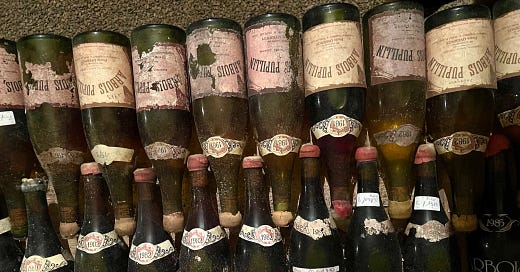Natural Wine and the Premium Paradox
Exploring the tension between anti-commercial ethos and high-market value in natural wine
This topic was sparked by a conversation with
over a couple of pints on a scorching Saturday afternoon. A topic that can definitely go deep into a rabbit hole, but I tried not to over-analyse it here. Plenty of room left for discussion.Natural or low-intervention wine was never supposed to be about price. It was a movement built on resistance - to formulaic winemaking, to chemical inputs, to the polished language of prestige and point scores. But somewhere along the way, something shifted.
Today, a cloudy, skin-contact Sauvignon Blanc from a converted barn in the Loire might cost more than a Premier Cru white Burgundy. And yet, you’ll never hear the producer call it “premium.”
Not because it isn’t. But because in this world, premium is a dirty word.
The Philosophy vs. The Price Tag
In the conventional wine playbook, premium is clearly defined:
Vineyard pedigree
Critical acclaim
Scarcity
Ageing potential
Price
It’s a system that producers like Château Margaux or Giacomo Conterno have mastered over decades. Prestige is built through consistency, structure, and brand equity - not just what’s in the bottle, but what stands behind it.
Natural wine plays a different game entirely. Most of these producers don’t have multi-generational estates. They don’t speak the language of phenolic ripeness or élevage. They build their reputation through different channels: lo-fi aesthetics, raw cellar practices, and community-based credibility. Their marketing lives on Instagram feeds or word of mouth, not Decanter panels.
And most importantly, they rarely frame their wines using hierarchical language.
No tiers. No flagships. No prestige cuvée.
Intentional Silence (That Speaks Volumes)
Producers like Overnoy (now stratosphere-level cult) price their wines based on real constraints - low yields, labour-intensive farming, tiny volumes. But they don’t label them as premium, because to do so would be to align with the very system they’re often pushing back against.
Here, quality isn’t communicated through prestige cues. It’s shown through transparency. Through the reflection of the land they grow their grapes on. Through tension in their wines. A wine is “good” not because it’s ageworthy or Parker-approved, but because it speaks honestly of place, process, and the people behind it.
But here's the irony: the more these producers reject the idea of premium, the more their wines become exactly that.
Cult natural bottlings from Burgenland, Victoria, or the Jura often sell out on allocation, command secondary market hype, and land firmly in the €200–€350+ range. Maybe even more. They don't need to say they’re premium - the market says it for them.
The Problem with Avoiding the Word
This resistance to “premium” isn’t just ideological. Sometimes, it’s economic. Many natural producers work with razor-thin margins and limited access to distribution or capital. Calling your wine premium opens you up to scrutiny - and raises expectations. It’s safer to let the wine do the talking. Keep the storytelling honest. Keep the pricing quiet.
But the downside is that without the usual signposts (ratings, branding, prestige hierarchy), even the most loyal natural wine drinkers fall back on price and importer reputation to make decisions. Authenticity might get you in the door - but recognition still helps move your bottles.
A New Definition of Premium?
In traditional circles, premium is earned through pedigree. In natural wine, it’s created through community. Scarcity, yes. But also trust, alignment, and shared values.
By refusing to play the old game, natural wine created its own - and in doing so, redefined what “premium” could mean. It’s no longer about status or structure. It’s about story. It's about who drinks your wine, and why.
This is one angle, but I’m curious to hear your thoughts. Let me know in the comments!
As always, thanks for reading - stay thirsty, stay curious. If you would like to further support me, you can follow me on Instagram or LinkedIN or tell your friends about this newsletter.
Aleksandar






As someone who has come to wine late in life, and late to the industry, the term "Premium", in terms of wine, means precisely nothing in specific to me. I suspect that's true for most consumers who aren't ardent collectors. "Premium" obviously means to imply higher quality, but it's a word that's used in food and beverage in non-precise ways ("Premium ice cream!" "Premium cheese!" "Premium beer!") so that I'm not sure the use of it or not really matters much. At least for me, I can say it definitely does not. I never think it actually has meaning beyond the maker wanting to claim some kind of ill-defined quality.